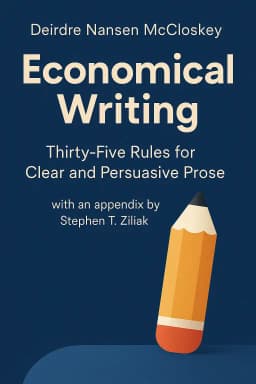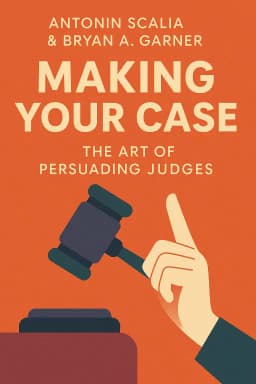
Your Body Can't Lie
Golden Hook & Introduction
SECTION
Michelle: Alright Mark, I'm going to say the title of a book, and I want your gut reaction. The Art of Reading Minds. Mark: Sounds like something you'd buy at a magic shop, right next to the disappearing ink and the fake thumb. A bit of fun, but not exactly serious stuff. Michelle: Exactly! And that's the tension at the heart of this book. The author, Henrik Fexeus, is actually a professional mentalist from Sweden. But he's also got a degree in philosophy, and he argues this isn't magic at all—it's a learnable skill based on psychology. Mark: A mentalist philosopher? That's an unusual combo. So he's trying to pull back the curtain on his own tricks? Michelle: In a way. The book was a massive international bestseller, translated into over 30 languages, so he clearly struck a nerve. He claims we can all learn to interpret the nonverbal signals people are constantly, and unconsciously, leaking. Mark: Okay, I'm intrigued. So it's less about a crystal ball and more about being a human detective. Where does this detective work even begin? Michelle: It begins by correcting a 400-year-old mistake made by one of the most famous thinkers in history: René Descartes.
The Great Deception: Why Your Body Can't Lie and How Rapport Unlocks the Door
SECTION
Mark: Whoa, starting with a takedown of Descartes? Bold. What did he get so wrong? Michelle: Well, you know his famous line, "I think, therefore I am." Descartes built his philosophy on the idea that the mind and the body are two completely separate things. The mind is this pure, rational thing, and the body is just a machine that carries it around. Fexeus argues this is the single biggest obstacle to understanding people. Mark: How so? It feels intuitive. My thoughts feel separate from, say, my elbow. Michelle: But are they? Fexeus tells this wonderfully ironic story about Descartes's own death. In 1650, he was invited to Sweden to tutor Queen Christina. He was used to a warm, cozy life in bed, but the Swedish Royal Palace was cold and drafty. He got pneumonia and died. Mark: That’s incredible. So the guy who said the mind is separate from the body was ultimately taken out by… the weather affecting his body. Michelle: Precisely. His body's needs were ignored, and it cost him everything. Fexeus's entire premise is that the mind and body are one system. Every thought you have, no matter how abstract, creates a physical reaction. Your heart rate might change, your pupils might dilate, a tiny muscle in your face might twitch. Your body is constantly telling the story of your mind. Mark: Okay, I can see that. When I get nervous, my palms sweat. When I'm excited, I can't sit still. So the signals are there. But how do you get someone to let you 'read' them? People are usually guarded. Michelle: That's where Fexeus introduces the golden rule of all human connection: rapport. He defines it as a state of mutual trust and openness. Without it, nothing else works. You can have the best idea in the world, but if you don't have rapport with your audience, they won't hear you. Mark: Right, like trying to get your kids to empty the dishwasher when they're in the middle of a video game. You have zero rapport. They don't even register your existence. Michelle: Exactly. And the basic rule for building it is surprisingly simple: adapt to how the other person prefers to communicate. Fexeus uses this great analogy. Imagine you meet someone who speaks English, but their native language is French. If you make an effort to speak even a few words of broken French, what happens? Mark: They light up. They feel seen, understood. They're more willing to meet you halfway and try speaking English. Michelle: You've just built rapport. You're sending an unconscious signal that says, "I'm like you. You're safe with me." Fexeus argues that we all have preferred communication "languages"—not just verbal, but nonverbal too. The key is to adapt to theirs. Mark: Okay, but adapting sounds a lot like mimicking. How do you do this without being creepy? The book even warns against the Single White Female effect, where you just copy someone and come off as a stalker. Michelle: That's the crucial distinction. It's not about blatant, conscious imitation. It's about subtle, unconscious resonance. Fexeus points to a fascinating experiment done at a telemarketing company. They divided their sales team into two groups. The control group did their usual script. The experimental group was given one extra instruction: match the speaking tempo of the customer on the other end of the line. Mark: Just the speed of their talking? Michelle: Just the speed. If the customer spoke slowly, they slowed down. If the customer was fast and energetic, they matched that. The result? The group that adapted their tempo increased their sales by almost 30 percent. The control group saw no change. Mark: Wow. That's a huge difference from one tiny change. So it's not about copying someone's posture, but matching their rhythm, their energy. Michelle: Exactly. You're tuning your instrument to theirs. Once you're in sync, once you have that rapport, the door is open. And then you can start to see what's really going on inside.
The Unconscious Broadcast: Decoding Sensory Channels and Emotional Leaks
SECTION
Mark: So rapport opens the door. What are we actually looking for once we're 'inside'? What are these signals the body is broadcasting? Michelle: Fexeus argues that we primarily process the world through three main sensory channels: Visual, Auditory, and Kinesthetic—or feeling. Most of us have a preferred, or dominant, system. And this preference leaks out in our language and even our eye movements. Mark: What do you mean? Like, a visual person talks about how things 'look' to them? Michelle: Precisely. A visual person will say, "I see what you mean," or "Let's get a clear picture of this." An auditory person might say, "That rings a bell," or "I hear you." And a kinesthetic person, who processes through feeling and touch, will say, "I can't quite grasp that concept," or "That idea doesn't feel right." Mark: Huh. I've never thought about it that way. It's like everyone is speaking a slightly different dialect. Michelle: And if you're a highly visual person trying to explain a big idea to a kinesthetic person, you might be showing them beautiful charts and graphs, but they're waiting to understand how it feels. Fexeus tells a story about three friends going to a concert. When asked about it later, the auditory person raves about the sound mix, the visual person talks about the amazing light show, and the kinesthetic person describes the feeling of the bass vibrating through the floor. Same event, three different realities. Mark: Okay, but this VAK stuff and the idea of Eye Accessing Cues—where people look up for visual thoughts, to the side for auditory—it feels a little bit like pop-psychology horoscopes. Is there any real science to this, or is it just a party trick? Michelle: That's the million-dollar question, and it's where the book gets a lot of its criticism from academic circles. Fexeus himself includes a very important disclaimer. He says these are "useful models, not objective truths." His point is that the act of paying close attention to these things, whether the model is 100% scientifically validated or not, forces you to become a better, more empathetic observer. Mark: I can see that. The goal isn't to be a perfect mind-reading machine, but to be more present and attentive. Michelle: Exactly. But if you want something more scientifically grounded, he also dives deep into the work of psychologist Paul Ekman on universal emotions. Ekman proved that there are seven emotions whose facial expressions are the same across every single human culture, from New York City to a remote tribe in Papua New Guinea. Mark: And what are these seven? Michelle: Surprise, sadness, anger, fear, disgust, contempt, and joy. No matter who you are or where you're from, the muscle movements for these expressions are identical. And they often leak out as "microexpressions"—flashes of true feeling that last less than a quarter of a second before our conscious mind can mask them. Mark: So we're looking for that flash of contempt before the polite smile is plastered on. That's the 'leakage'. Michelle: That's the leakage. But Fexeus gives a critical warning here, which he calls "Othello's Mistake." In Shakespeare's play, Othello accuses his wife Desdemona of cheating. She's terrified of his rage, and he misinterprets her fear as a sign of guilt. Mark: And he kills her for it. Michelle: He does. The mistake was seeing the emotion—fear—but completely misjudging its cause. He assumed her fear was because she was guilty, when in reality, her fear was of him. So even if you spot an emotion, you can't assume you know why it's there. You have to investigate.
The Ethics of Influence: Planting Ideas and Triggering Emotions
SECTION
Michelle: And that's the danger, right? Once you can read emotions, the next logical step is trying to change them. And this is where the book gets really powerful, and frankly, a bit scary. Mark: This is where we get into the 'art' part of the title. The active influence. Michelle: Yes. Fexeus introduces the power of suggestion, and one of the most counter-intuitive ideas is how our brains handle negations. I'll give you a simple command: Don't think of a blue polar bear. Mark: Right. And of course, the first thing I see is a giant, fluffy, blue polar bear. Michelle: Your brain has to first create the image of the blue polar bear in order to understand what it's not supposed to think about. Fexeus points to Richard Nixon's infamous declaration: "I am not a crook." What did that sentence do? It forever linked the words "Nixon" and "crook" in the public mind. He would have been better off saying nothing. Mark: Whoa, hold on. This is starting to sound like straight-up manipulation. How is this different from just tricking people? I mean, the author is a mentalist. His job is literally to use psychological trickery for entertainment. Michelle: You've hit on the core ethical dilemma of the book. Fexeus is very clear about this. He quotes Spider-Man's uncle: "With great power comes great responsibility." He argues that we are all influencing each other all the time, whether we realize it or not. The goal is to become conscious of that influence and use it for good—to help someone feel more confident, to de-escalate a conflict, to connect more deeply. Mark: But the line feels blurry. Where does it cross over? Michelle: It crosses over when the intent is purely self-serving and disregards the other person's well-being. But he provides tools that are ethically neutral, and one of the most powerful is called "anchoring." An anchor is a stimulus that is connected to a specific emotional state. Mark: Give me an example. Michelle: The theme music from the movie Jaws. That simple two-note score—dun dun... dun dun...—is a perfect auditory anchor for fear and suspense. Spielberg plants it every time the shark is near, and soon, he only needs to play the music to make the audience terrified, even with no shark on screen. Mark: I still get chills hearing that. So an anchor is like a trigger for an emotion. Michelle: A trigger you can create intentionally. Think of a more positive one. The author Marcel Proust wrote about how tasting a madeleine cake dipped in tea instantly transported him back to the joy and comfort of his childhood Sunday mornings. The taste and smell were an anchor for that entire emotional world. Mark: So that's why the smell of my grandma's baking instantly makes me feel safe and happy. It's a positive anchor she built over years. Michelle: Exactly. And Fexeus teaches how to create these anchors in yourself—like a "confidence anchor" you can fire off before a big presentation—and how to use them to help others. For example, if a friend is feeling down, you can get them talking about a time they felt incredibly happy and successful. As they re-live that feeling, you can create a subtle physical anchor, like a light touch on their shoulder. Later, that same touch can help bring back some of that positive state. Mark: I see. So it can be used for good. But it still feels like a superpower. It's a bit unnerving to think about how much of this is happening to us all the time without our knowledge.
Synthesis & Takeaways
SECTION
Michelle: It is. And I think that's the ultimate takeaway from The Art of Reading Minds. The true "art" isn't about learning a set of magical tricks to control people. It's about developing a kind of radical attention. It’s about fundamentally shifting your focus from yourself to the other person. Mark: So the secret to reading minds is to stop trying to be the most interesting person in the room and start being the most interested. Michelle: That's a perfect way to put it. You're not trying to guess their PIN code; you're trying to understand their emotional world. Fexeus says if everyone learned these skills, we'd become better people for a simple reason: we would finally be paying attention to each other instead of just to ourselves. Mark: It reframes the whole idea. The power isn't in knowing what someone's thinking, but in giving them the feeling that they've been truly seen and heard. That's probably what people are craving more than anything. Michelle: I think so. The book gives you the tools to do that. To notice if someone is communicating in pictures, sounds, or feelings. To see the flash of sadness they're trying to hide. To build the rapport that makes them feel safe enough to be themselves. That's the real magic. Mark: So for our listeners, what’s one practical thing they can try this week, without needing to become a full-blown mentalist? Michelle: I love that. Here's a simple one. In your next important conversation, don't try to do everything. Just try to notice one thing: is the person you're talking to using more visual words, auditory words, or feeling words? Are they saying "I see," "I hear," or "I feel"? Just notice. That's the first step on the path. Mark: Just pay attention. It sounds so simple, but it's probably the hardest part. Michelle: It is. But it's where all understanding begins. Mark: This is Aibrary, signing off.









